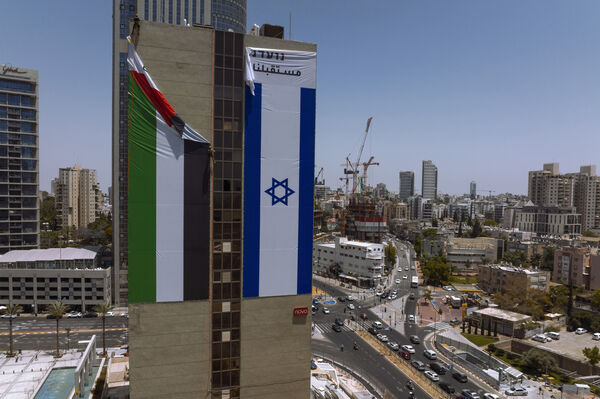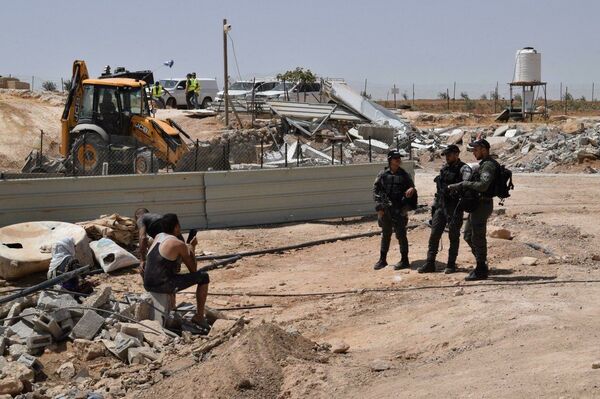Newsletter
Jun
7
2022
Welcome to the Tuesday News Bulletin! Jewish Currents is constantly getting quotes and scooplets from our network of sources, and every Tuesday, we release small stories exclusive to our newsletter subscribers in emails like this one. In addition to original reporting, the Tuesday News Bulletin serves as a forum for aggregating stories Jewish Currents staffers are tracking, with plenty of links to other publications so you can keep up with everything happening on our beats.
If you have more stories or tips, you can reach Isaac Scher at isaac@jewishcurrents.org.

A Palestinian flag is removed from a building by Israeli authorities after being put up by an advocacy group that promotes coexistence between Palestinians and Israelis, in Ramat Gan, Israel, June 1st, 2022.
June 7th, 2022
(note: Senior Reporter Alex Kane is on parental leave; this is a guest post from Jewish Currents contributing writer Isaac Scher)
On June 1st, a member of the Likud party introduced a bill in the Israeli Knesset outlawing the display of the Palestinian flag at institutions that receive funds from the Israeli government. It passed an initial vote that day by a wide margin—63 members, most of them right-wingers, voted in favor, while just 16 voted against. Few center-left Knesset members were present for the vote, the first of four before the bill can become law.
According to the text of the bill, at most public institutions, displaying the flag of “any enemy state” would be illegal under the legislation, though only the Palestinian flag is specifically mentioned. “Flying such flags will be considered an illegal gathering that will be dealt with like a riot that can be dispersed,” the bill reads. “The state of Israel, as a democracy, allows its citizens to protest against issues where they disagree with the authorities. However, this bill draws a red line between legitimate protest and protests during which flags are flown of those who do not recognize the state of Israel or pose a threat to its existence at state-funded bodies.”
Though the bill’s chances of becoming law are unclear, its introduction is part and parcel of Israel’s wider effort to more fully embed Jewish supremacy in its legal codes: In 2018, for example, the Knesset passed a quasi-constitutional law, known as the Nation-State Law, which formally classifies the right to “self-determination” as the sole province of Israeli Jews. The bill to ban the flag further codifies the repression of Palestinian national identity. “This is another manifestation of Israel not being a state for all its citizens, even by law,” Dana El Kurd, a political scientist at the University of Richmond, told Jewish Currents. “I wouldn’t say Israel is slipping further into fascism. But it’s revealing its fascism more clearly.”
The flying of the Palestinian flag has frequently been under some form of official sanction in Israel. In the first days of Israel’s 1967 occupation of Gaza and the West Bank, Israel criminalized displays of the flag or its colors. A 1981 military order forbade artists under occupation from rendering any amalgam of red, black, white, and green in their works. The Palestinian painter Nabil Anani recalled being told by an Israeli intelligence official that he could not portray even “a flower with the different petals showing each color of the flag.” In 2001, the Israeli Attorney General’s office argued that waving the Palestinian flag could be illegal if “criminal intent” was proven, or if the flag-waver identified “with the [Palestine Liberation Organization] as a terrorist organization.” In the last decade, Israeli lawmakers have tried several times to pass bills curtailing the display of the flag, though none of the efforts succeeded.
This time, the proximate cause of the push to ban the flag was a series of student demonstrations at several universities on Nakba Day, the annual May 15th commemoration of the systematic ethnic cleansing of Palestinians that accompanied and facilitated the establishment of the State of Israel in 1948. About 18% of university students in Israel are Palestinian, roughly tracking with the proportion of Israeli citizens who are Palestinian. During Nakba Day last month, students rallied at Ben-Gurion and Tel Aviv universities, holding picket signs and flags. The demonstrations were met with swift police backlash; some students were detained, and others were beaten. The bill’s author, a Likudnik named Eli Cohen, accused the students of attempting to incite antisemitic violence, and suggested that the Palestinian flag symbolized terrorism. The students’ flag-waving “represents the aspirations of those that want to eliminate the Jewish state,” he said. “Imagine to yourself that in America, they would raise the flag of al-Qaeda, imagine that they would fly [Irish Republican Army] flags in a British hospital . . . it is inconceivable.”
The proposed ban also responds to government instability. For the Israeli right, the current attempt to criminalize the flag could be a strategic political move, as the ruling coalition—a fractious set of Palestinian and Israeli Jewish parties spanning the political spectrum—teeters on the edge of dissolution. “The bill drives a wedge between this very fragile coalition,” said Yousef Munayyer, a political scientist and a contributor to Jewish Currents. He noted that on the Israeli far right, the ruling coalition is seen as too soft on Palestinians. If the bill fails, the right could “rile up a nationalist anger that pushes this government out and bring a solidly right-wing constellation into government.” (A second bill, to maintain the status quo in which Israeli civil law extends to Jewish settlers living illegally in the West Bank, also threatens to fatally destabilize the coalition.)
Even if the bill doesn’t become law, its introduction underscores the dominance of the Jewish-supremacist right. Days before the bill was introduced, thousands of Israeli nationalists stormed through occupied East Jerusalem for an annual “Flag March.” Police forces shot Palestinians in the area with rubber-tipped bullets and live rounds, shutting down the city for Jewish demonstrators who yelled “Death to Arabs” and other Zionist chants. The march has intensified in recent years along with the legal repression of Palestinians. Ultimately, the dynamic is “making it so that there’s no other trajectory but violence,” El Kurd said. Israel “is not even attempting to extend piecemeal liberal human rights. It’s going the opposite direction.”

On June 1st, the Israeli Civil Administration carried out mass demolitions of 10 structures in Al-Fakheit and Al-Mirkez, two villages in the Masafer Yatta region of the West Bank. The majority of the structures belonged to the same families whose homes were demolished on May 11th, days after Israel approved the forced expulsion of Masafer Yatta’s residents. Since December 2021, Israel has carried out mass demolitions of Al-Fakheit and Al-Mirkez three times.
As part of the Tuesday News Bulletin, Jewish Currents is publishing a photograph taken by members of Activestills every week, archiving ongoing dispossession and resistance from the river to the sea. You can find more information on this collaboration here.
-
Sixty percent of Israeli Jews favor segregation from Palestinians, according to a new survey by the Israeli Democracy Institute—a rise from last year’s survey result showing that 45% of Israeli Jews supported segregation. According to the 2022 results, almost 70% of Israeli Jews who define themselves as right-wing support segregation, compared to nearly half of centrists and one-third of liberals and leftists. Young people, according to the survey, tend to favor segregation more than older people, and women tend to favor it more than men. The lead scholar on the survey told Haaretz, “There has been a decline in willingness among Jews to live in proximity to Arabs or allow them to purchase land outside of Arab municipalities.”
-
On Monday, Democratic Sen. Jon Ossoff and Republican Sen. Mitt Romney called on Secretary of State Antony Blinken to “ensure there is a full and transparent investigation” into the killing of Shireen Abu Akleh, a Palestinian American reporter. In a joint letter, they wrote, “We insist . . . that justice is served for Ms. [Abu] Akleh’s death. Please provide a detailed update on the progress of this effort within 30 days.” Days earlier, 24 House lawmakers, 10 of them Republicans, wrote a similar letter to Blinken, criticizing the Palestinian Authority’s refusal to cooperate with Israeli investigators and urging the US to convene the parties. (The earlier letter only refers to the killed journalist as “Abu Akleh,” seemingly misunderstanding her name.) “Please let us know what actions you plan to take in this urgent matter,” the letter said.
The political action committee of Democratic Majority for Israel (DMFI) is running ads against the progressive Rep. Marie Newman,The Intercept reported last week. In keeping with a strategy that is increasingly popular among Israel advocacy groups, the ad does not mention Newman’s criticisms of Israel. Instead, it accuses her of corruption, taking up the Office of Congressional Ethics’s probe of Newman after a right-wing group filed a complaint against her. (The PAC of the liberal Zionist organization J Street, which endorsed Newman in 2020, has not re-endorsed her this cycle, possibly because of the probe.) Newman told The Intercept that DMFI’s ad was part of “an ongoing march against progressive women.”
The Pentagon is considering whether to downgrade the official rank of the US post that coordinates security with the Palestinian Authority, Axios reported last week. The US security coordinator role, a three-star general position, was created in 2005, after the Second Intifada. The post could be downgraded to the rank of colonel, following a Trump-era plan to reduce the number of generals and admirals. Downgrading the post could limit the security coordinator’s access to senior officials. Former US Ambassador to Israel Dan Shapiro said, “At a time when Israelis, Palestinians, and many Arab states are all looking for signs that the US remains committed to the region, downgrading the USSC and other regional military attachés makes little sense.”
Students at Birzeit University in the West Bank overwhelmingly voted in favor of the student-union group associated with Hamas, the ruling party in Gaza, +972 Magazine reported last week. The Hamas-affiliated group won 60% of the vote, while the student-union group associated with Fatah, the Palestinian Authority’s ruling party, won 40%. “The annual elections at Birzeit are widely regarded as a reflection of the broader political mood in the Palestinian street in the occupied West Bank,” wrote +972 reporter Basil al-Adraa. Discontent with PA governance is reaching a fever pitch, given the Authority’s repression of West Bank Palestinians and its coordination with Israeli forces. Militant opposition to the Israeli regime, of the kind practiced by Hamas, is also growing. Recent scholarship from Dana El Kurd, who studies Palestinian public opinion, found that a majority of Palestinians support violence. She recently told Jewish Currents, “They’re not Islamists and they’re not pro-Hamas. They are often on the left. Ideologically they are very opposed to the groups putting up these attacks. If even the most ideologically opposed people support violence, that says something about the broader society.”